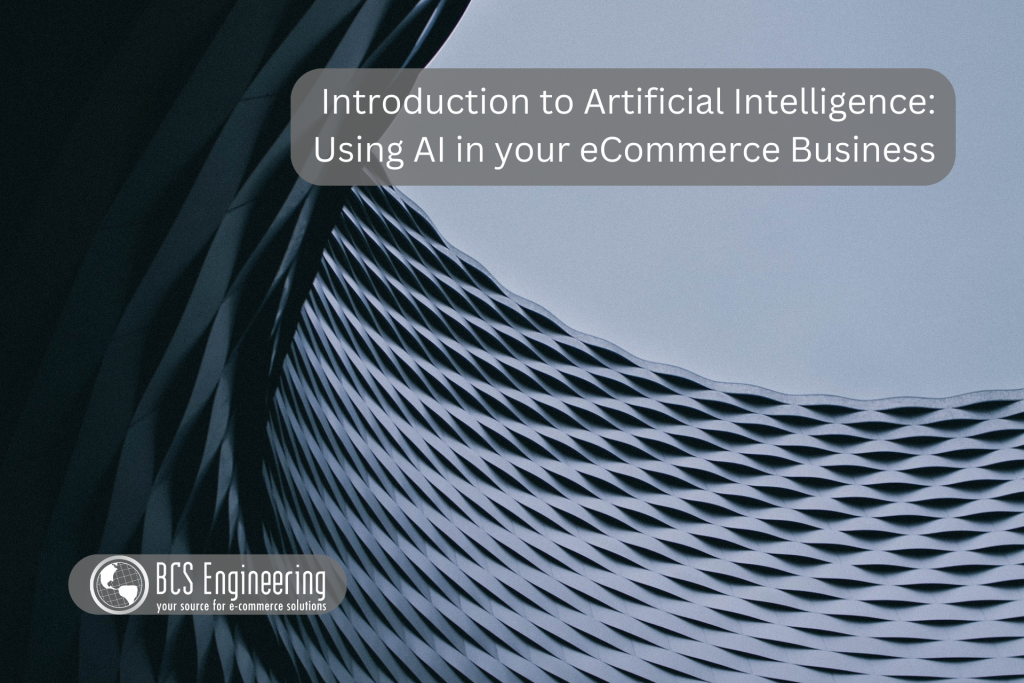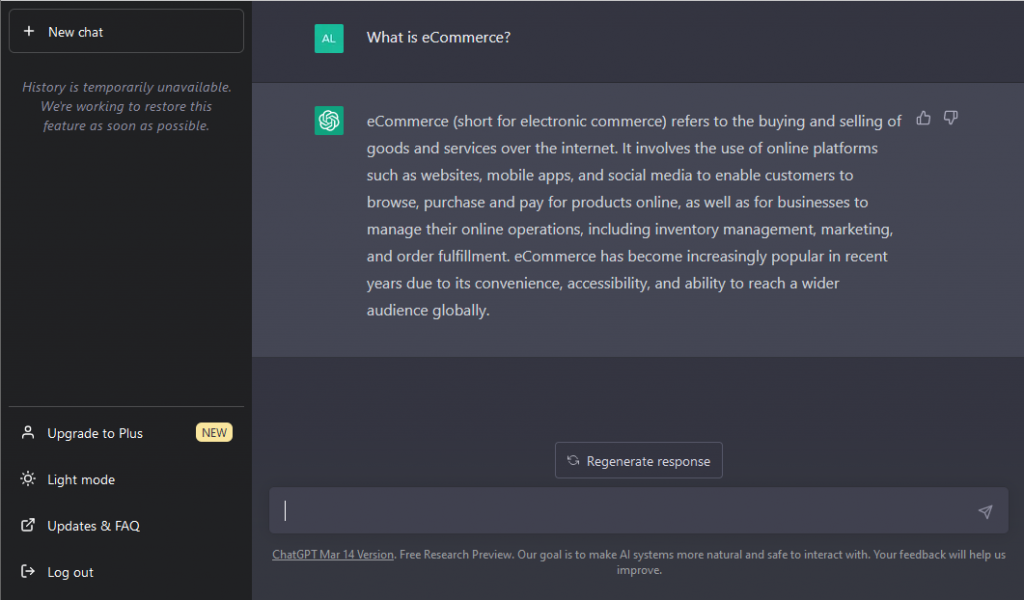With the popularity of ChatGPT skyrocketing recently, it’s hard not to think about Artificial intelligence (AI) and its implications on our workflows. Many companies have already incorporated a variety of AI software into their business process. How can we start using AI to further our eCommerce goals?

What is AI?
Artificial intelligence (AI) is the process of teaching machines to mimic human intelligence. AI software, such as ChatGPT, are trained through large collections of data to provide educated, human-like results to the tasks we implement them in.

In the case of ChatGPT, the AI software is a language model that answers questions and scenarios given by users through its training in human conversation and knowledge. Other AI software has targeted a variety of tasks, such as content creation and editing, analytics, security, and customer care. While this may sound like a means of replacing human workers, AI in its current state is a more of a tool rather than a replacement.
What are the Pros & Cons of AI?
Benefits of AI
In terms of using AI in our business processes, there are multiple benefits, as well as a collection of limitations we should keep in mind as well use these tools. To start, some benefits we can gain from AI software are:
- Reduced time to complete routine tasks – One of the most useful ways we can utilize AI for is cutting down the amount of time we need to complete simple, routine tasks. For example, for marketing tasks, we can utilize AI software to do preliminary research, create outlines or drafts, and even come up with ideas for us when we are stuck.
- Access to real-time analytics on your business – With the help of AI and machine learning, we can analyze how our business is doing in real time, as well as obtain courses of action and recommendations. From security risks to customer product suggestions, AI can help us quickly react to anomalies or patterns that humans may not be able to quickly identify.
- Ability to Research new topics quickly – Since AI software consume large amounts of data in order to learn, we can use tools such as ChatGPT to get quick overviews of research topics.
- Improved customer experience – Due to its analytics capabilities, AI software can help us identify trends in customer behavior quickly, as well as create personalized experiences for them. From personalized offerings to automated customer service, AI can tailor the user experience per user.
- Innovation through predictive analytics – By analyzing huge amounts of data, AI can help us identify new opportunities. For example, AI can help us note patterns that we can use to either establish correlations, or even identify gaps that we can fill as businesses.
Limitations of AI
As stated before, AI at the time of writing this article is better used as a tool rather than a full-on replacement for human work. This is due to the following limitations of AI software:
- Lack of creativity – Since AI is taught on data sets, creating new ideas is difficult for AI to do. AI software only knows as much as you give it access to, and while it can create written content or art, all of its creations are based on previously explored ideas rather than new ones. It’s up to us to identify those opportunities still with the help of AI.
- Cost of implementation – Fully incorporating AI into your business can be expensive, especially when it comes to complete solutions of customizing AI software to suite your existing infrastructure.
- Questionable accuracy – While AI can identify patterns and share its analysis with users, its knowledge base and understanding of human concepts can be limited. Due to this, you can’t take everything it says as the truth. For one, AI is trained on data sets that can contain inadvertent biases. Secondly, AI shares patterns that may contain inaccurate information. For example, while using ChatGPT, facts such as time, place, or people may be merged together, creating false narratives.
- Concerns about privacy implications – When using AI software, it’s hard to know where the data it was trained on came from. How do you cite AI content? Furthermore, if we put our customer data into AI software, what happens to the data? How are we making sure our customers’ privacy is upheld? Making sure to have answers to these questions is important when considering using AI software.
- The risk of dependency – While AI offers us enhanced, powerful tools, it is important to remember that it is not a full solution. Human hands and outside sources of knowledge are still needed to effectively run your business. Growing dependent on AI can lead to vulnerabilities for your business.
How can I use AI in my business?
Getting started with AI can be daunting, so it is best to start with small steps. To start, we can utilize AI software to do some of the preliminary work of our most common tasks. Marketing, for example, can be a good place to get started. To dive into a few, AI can help us in our efficiency and optimization goals in our market research, content creation, and SEO strategies.
Market Research
As another reference, we can use AI software to help us quickly get a bigger picture of our market, competitors, customers, and so forth. Using AI software such as ChatGPT, we can use AI to identify patterns in our market. With those patterns in mind, we can start finding gaps in our industries that we can use to stand out amongst the competition. On top of identifying business opportunities, we can use AI to quickly research best practices in our markets as well as tools and resources.
Content Creation
When creating content for our users, we can us AI software to speed up the process. From social media posts and blogs to product descriptions and our email campaigns, AI can help us get through the preliminary creation steps. Ever get writers block? AI can help! Ideas, keywords, outlines, and drafts can be made quickly with the help of AI, cutting the process time and keeping tasks moving. Advanced marketing, such as personalized product recommendations and emails, can even be optimized with AI by identifying buying patterns and user preferences for you.
Search Engine Optimization (SEO)
In our SEO strategies, AI software can help us identify new areas of opportunity. From finding related keywords to quickly analyzing our current SEO work, AI can help us enhance our SEO strategies with data-backed recommendations. AI software can also help weigh the impact of our changes by predicting the future performance of our new content. Overall, new, viable paths can emerge from using AI to aid our SEO process.
Want to read more on AI?
AI is evolving fast, and new use cases are being explored. If you are interested in reading more about AI, contact us! Tell us what you want to learn about, and we can help you through it.
